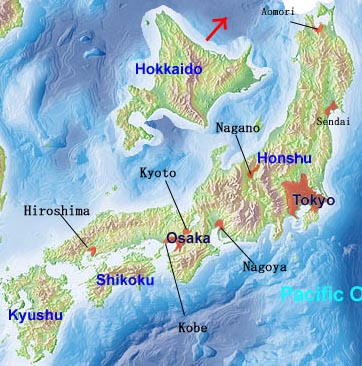If you know anything about Japanese, you've probably heard someone say "Oh,
that guy speaks Osaka dialect" or "That girl speaks Touhoku-ben"
or something similar at least once or twice. In anime and manga, there's usually
at least one token comic relief character from Osaka. Even if you don't know
Japanese yourself, if you hear it enough you'll often begin to start developing
sort of a "feel" that some people are talking differently than others.
In America, English was basically completely developed by the time the country
was founded. While the language has changed since then, it's almost identical
wherever you travel. For example, The Declaration of Indepence is a pretty high-brow
and stodgy document, and sounds old, but anyone can still read it. Sure, go
to the deep South and people have an accent and use a few funny words. ("Ya'll
come back now, y'hear?") Watch the movie Fargo and you can hear the
accent at the far north of America. ("You betcha!" "Dontcha'know!")
New Yorkers talk differently, ("Eh, I'm walkin' 'ere!") southern
Californian surfer dudes have their own accent, ("Duuude, like...")
etc. The difference is that only the accent and a handful of words are different.
Some people say "coke," some say "soda," some say "pop."
"Dinner" or "supper." "Basement" or "cellar."
This doesn't even compare to Japanese. Japanese actually developed semi-independently
across several different areas in the country since ancient times. To make matters
worse, most of this happened before there was any way to get around other than
horseback, or walking. If you've ever been to Japan, you've noticed that most
of the country is either straight up, or straight down, and what little flat
land there is has already been built on. It's almost like you'll just be walking
along, and then you'll bump your nose. "Oh. It's a friggin' mountain. I'll
have to go around." Travelling around the country in ancient times would
have really sucked.
Here's the major cities of Japan that have their own dialects.
There's other big cities, but these are the biggest ones important
for understanding dialects.
The words in blue are the names of the islands. Originally "Japan"
was only Honshu, so the biggest differences are on the main island.
|
|
Hokkaido is actually to the north of Honshu. But that
takes up too much space, so I moved it, just 'cuz I can. You can see
the hole where it used to be.
|
So people stayed home. You have your little farm, and everything's decentralized
so there's no reason to go anywhere. You pretty much just chill where you were
born. As a result, Japanese has several regional dialects that are extremely
different from one another. Not just accent, but the actual grammar,
sentence structure, and word choice is different. People living in Japan for
the first time are usually suprised to see that nationaly-broadcasted TV shows
are often subtitled, in Japanese. This is (among other reasons), so people
throughout the country can understand what's being said.
Here's the results of a poll done recently by the government. People from different
areas were asked to listen to recordings and categorize where they thought the
people came from. First they were asked to identify a single city, and if they
couldn't, they were asked to select either kanto or kansai.
Kanto-ben
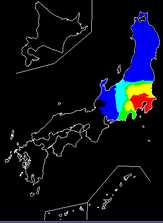
|
Back during the Shogunate, the samurai government got really desparate
for money. One of the things they thought of was to divide the main
island in to East and West, block all the roads, and charge people a
boatload of money to cross. Rather than raking in the cash, people just
stopped travelling across the line.
Kanto means "east of the line" and is a catch-all
word for anything in Eastern Japan. -ben is a suffix meaning
"dialect." This includes Tokyo predominantly but the north
is also considered kanto. The major cities in the kanto
region all have their own dialects, but people tend to lump them all
together as "east of the line." Textbook classroom Japanese,
what the government calls hyoujungo or "standard
language", is kanto-ben. It's the official language
of business and government, and therefore just about everyone in Japan
can pull off a passable version of kanto-ben if absolutely
necessary, although with difficulty. Listening to a character from another
region struggle to speak kanto-ben in a formal setting
is a very common sort of "inside joke" in anime and manga
which is totally lost in translation.
Kanto-ben emphasizes the consonants of the language more
than the vowels, and tends to be more brisk, monotone, and clipped than
kansai-ben.
|
Kansai-ben
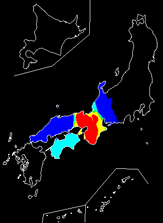
|
Kansai means "west of the line." You'll see
by the big red blob, this is primarily the major cities of Osaka, Kyoto,
Kobe, and Nagoya, but each of these cities claims to have its own dialect
as well. People just lump anything west of here as kansai-ben.
Kansai residents claim to be more laid back and good-natured
than kanto people. I've heard countless Osaka residents
claim Tokyo people have no sense of humor, and Tokyo folk who claim
Osaka folk are slackers. It's said that the stereotypical vertical Japanese
society is more relaxed in kansai than in kanto,
but people disagree on this point across The Line.
Kansai-ben emphasizes the vowels of the language more
than the consonants. It tends to be slower, wider, and more nasally
than kanto-ben. English voice dubbing will usually replace
a kansai character with someone with a Southern drawl,
but this doesn't really work, because kansai is a major
metropolitan area. It doesn't have the rural "hick" feel that
a southern drawl has.
|
Tokyo-ben
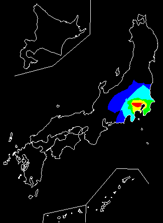
|
The problem with defining tokyo-ben is that it's the
capital city, and therefore what's spoken in Tokyo is supposedly the
standard "national" language. Unless they've grown up in downtown
Tokyo, (the little red spot to the left), Japanese people will usually
say that Tokyo doesn't have a dialect of its own, because it's all "standard
Japanese."
For formal, polite speaking, this is true. Polite tokyo-ben
is what you learn in Japanese class. For informal speaking, nothing
could be farther from the truth. Informal Tokyo Metropolitan dialect
is fast, clipped, and often slurred. Great emphasis is placed on the
consonants over the vowels. R's are often emphasized and
rolled similar to Spanish or Italian. Men almost universally change
words that end in ai or oi to ee for
emphasis. (urusai -> 'rrusee for "shut up.") It
has a feeling of brisk, tough, no-nonsense street talk. Male lead characters
in manga and anime are almost universally tokyo-ben.
The ai to ee change is partially responsible
for the American anime crowd overusing the sentence-final particle ne.
Any word that ends in nai often becomes nee
in tokyo-ben. This isn't ne, but a very
rough form of nai, which has the opposite effect of the
sentence softener ne. "Shut the hell up, I am NOT!"
(Urusai, sou ja nai! -> 'rrusee, sou ja nee!)
Ask anyone outside of Tokyo though, and they'll claim this is all universal
Japanese. Anyone can understand it, and most people can pull off a decent
imitation, but it's not as widely used, and not as "authentic"
outside the capital.
|
Osaka-ben
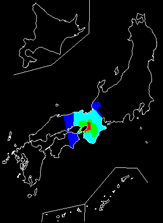
|
Osaka-ben is the second most common dialect that can
be attached to a single city. Tokyo-ben and osaka-ben
are probably the two most widely heard dialects, and there's almost
a sort of rivalry between them. They're also the most different.
Osaka is the second largest city in Japan, and was the
biggest until the Shogunate artificially grew Tokyo/Edo by moving the
capital out of nearby Kyoto. In my opinion, it seems a lot of them are
still rather bitter about the whole thing too.
Osaka-ben grammar is very different than standard Japanese.
The easiest way to identify it is the way it changes desu or
da to yanen or ya. If you hear a lot of ya's
or yanen's at the end of sentences, it's osaka-ben.
Polite verbs ending in -masen become -mahen, -san
often becomes -han, chigau becomes chau, and thousands
of other changes that people not born in Osaka could probably never
truly master. Some words are shortened, some grammar structures are
changed, omitted, or added. iru/imasu becomes oru/orimasu.
Personal pronouns change, name suffixes are changed, really it's almost
like an entirely different language.
Osaka-ben is synonymous with comedians and entertainers,
and almost every comedy act or stand-up comedian in Japan will speak
in Osaka-ben. Without it, it's like trying to watch British
humor without the British accent. It just doesn't work. Comedy is
Osaka, and the comic relief character in anime or manga will almost
always talk in Osaka-ben. To people outside of the city,
it just sounds funny. I've also been told that a lot of women
find it sort of sexy.
The Osaka dialect shares a lot of the properties of kansai
in general. It's slower, more nasally, and emphasizes the vowels over
the consonants. Most people who labelled the recordings "kansai"
were actually hearing osaka-ben, so it sets the standard
for the whole region.
Please don't try to imitate osaka-ben if you are not
from Osaka, unless you are very good at the language. You will
sound like an idiot. You can't simply change da to ya
and say "hey, I'm speaking osaka-ben!" If you
really want to learn, there are several
books you can start with, but use them with care.
|
Touhoku-ben
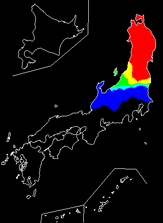
|
Touhoku isn't a city, but the vast rural area north of
Tokyo containing the major cities of Sendai and Aomori. People not from
the area will claim it's all kanto-ben, but it's really
not.
Touhoku is not nearly as populated as central Honshu,
and as you go farther and farther north it gets pretty sparse. You start
to hear more jokes about empty space and cows as you mention places
up towards the tip. Because of this, touhoku-ben is occasionally
the brunt of jokes claiming its somewhat "hick"-ish. It's
not really, (well maybe the far northern tip is,) but its an easy joke
for people from the major cities.
Characters that are supposed to be from very rural areas, who don't
know cities well, will often speak in touhoku-ben, although
usually only when they get angry or upset, and lose their grasp on standard
kanto-ben. In actuality, Sendai and Aomori are pretty
big cities, and really can't be labelled as "country bumpkin."
Touhoku-ben is very close to standard kanto
and it's hard to pick up the differences unless you know the language
very well.
|
Chubu-ben

|
Chubu is the region surrounding and centered on Nagano,
where the winter Olympics were held a few years back.
It falls technically into the kanto region but no one
there would really categorize themselves as kanto. This
is not a very famous dialect, but you can tell from the red blob in
the center that the Nagano people feel it's very strong and unique.
I don't know what comprises chubu-ben, which means it
can't be as strongly unique as, say, Osaka. In fact, I didn't even know
there was a chubu-ben until I found these poll graphics.
But apparently there's something different there.
|
Nagoya-ben
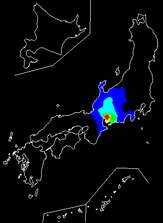
|
Nagoya-ben unfortunately doesn't exist much anymore.
(Although Nagoya residents would kill me for saying it.) It used to
be a very strongly unique dialect, but a lot of people thought it sounded
ugly and it was brutally made fun of by the mass media. As a
result, outside of Nagoya proper you're not going to hear it very much.
It falls basically right on the line between kanto and
kansai and shares similarities with both.
|
Hiroshima-ben
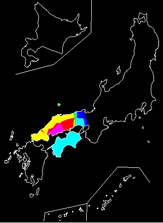
|
Of course, it's impossible to hear the name Hiroshima
without thinking of the atomic bomb. Yes, the city was destroyed, 150,000+
died, but it was a relatively tiny bomb that was dropped, and the area
became livable again very quickly. Today it is a major urban center
and port city.
Hiroshima-ben starts to sort of fade out from kansai
and shares more with the dialects of the Shikoku and Kyushu islands.
This means the word choice and grammar structures begin to change. In
my travels to Hiroshima, I didn't hear a great deal that could be categorized
as "unique" to Hiroshima, but this is probably because people
heard me speaking tokyo-ben and adjusted so we could understand
each other. However, if you look at the map, there's obviously something.
People from the southern tip of Honshu and the southern islands do
talk very differently, and it's easy to identify, but it's hard to give
concrete examples of how it changes.
|
Kyushu and Shikoku-ben
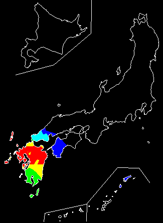
|
Kyushu and Shikoku have their own unique
dialects. I've only included one of the pictures here because the other
is easy to predict. Just imagine the other island is colored red instead.
I'm out of my expertise here. Never been to Kyushu or Shikoku. I know
the dialect is very different, because I have trouble
understanding native Shikoku or Kyushu folk when they're talking amongst
themselves. It is relatively unknown by the rest of Japan and seldom
used on television or the mass media.
Kanto and kansai only refer to the eastern
and western halves of the main island. Kyushu and Shikoku
fall outside of this. They're their own thing, although I'm not quite
sure what that thing is.
|
Miscellaneous Dialects:
Okinawa and Ryukyu Islands: Most Japanese people just throw up
their hands when you ask them about okinawa-ben. Okinawa wasn't
even part of Japan until the last century or so, so the dialect spoken there
is almost a different language entirely. I've heard the dialect called "Japanese
with a touch of the rest of Asia." I could detail all the ways it's different,
because it's so separate from standard Japanese that it's famous in its own
way, but they are tiny islands. It's really not worth it to put them all down.
Kyoto-ben: People from Kyoto would kill me if they knew I left
them out, but Kyoto is really very close to Osaka dialect, but not as strongly
unique. The thing that sets Kyoto apart is that it was the capital of Japan
for nearly 1000 years. This means there are hundreds of little figures of speech
that mean something entirely different, left over from a thousand years of court
politics. It has several unique things of its own, primarily that "desu"
is often changed "dosu" by women, with both syllables fully
pronounced. (desu sounds more like dess in standard Japanese,
because the u is dropped due to laziness.) Otherwise it shares everything
in kansai, especially the -sen to -hen and -san
to -han.
Kobe-ben: Kobe is right next door to Osaka.
The dialects are virtually identical, but people in Kobe claim they are different.
So, I've included it here. Can't tell you how they speak differently from someone
from Osaka though.
Hokkaido-ben: You may have noticed that the northern island of
Hokkaido was left out entirely. To be honest, this is because
not a great deal of people live there compared to the rest of Japan, and those
who do are mostly in the main city of Sapporo. (Where the beer comes from.)
Hokkaido is synonymous with "cold." No one I've talked to in Japan
seems to know if Hokkaido folk have their own dialect, so they probably don't.
One explanation is that Hokkaido was added to the Japanese nation much later
than the rest of the islands, and by that time, "standard Japanese"
had already been mostly agreed on. The people that moved to Hokkaido when it
was colonized therefore already spoke pretty standard hyoujungo.
Other cities: It seems every city in Japan has its own unique
couple of words or phrases that you don't hear anywhere else. I can't put them
all down here, but there's dozens.
